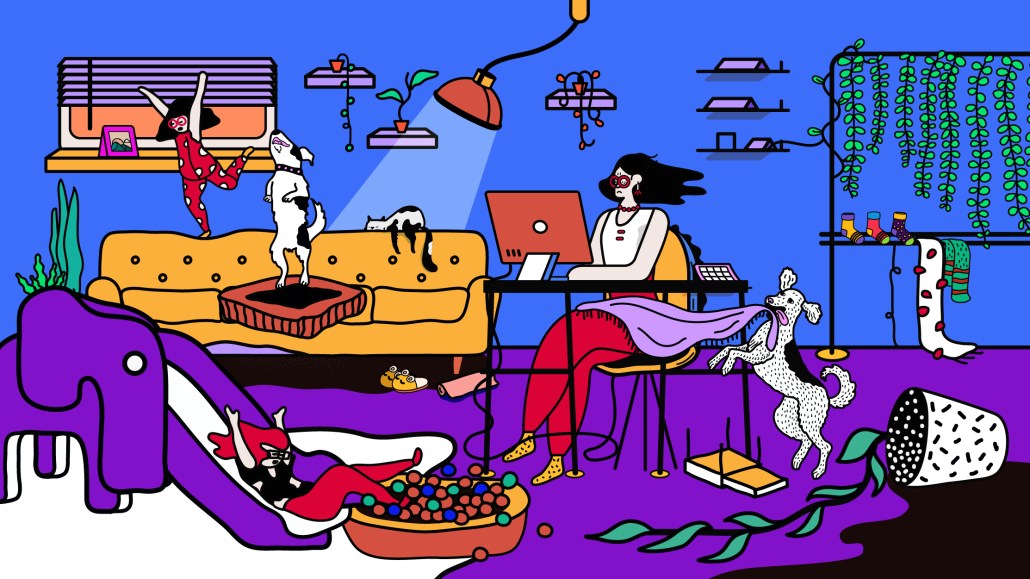Secure your place at the Digiday Media Buying Summit in Nashville, March 2-4
‘We can work all over the place’: How being fully remote has helped one young branding agency become a global player

This article is part of the Future of Work briefing, a weekly email with stories, interviews, trends and links about how work, workplaces and workforces are changing. Sign up here.
This is part of a special package from Digiday about what comes next, looking to the other side of the current crisis to explore the lasting changes that are coming about.
At inception, Main and Rose had an office. The now fully remote strategic branding agency, founded in 2013 by CEO Kelly Gibbons and managing partner Beth Doane, even took its name from the intersection of Main Street and Rose Avenue in the Silicon Beach neighborhood of Los Angeles where its former office was located.
“After all the tech companies moved in, our rent skyrocketed,” said Doane, adding that paying the exorbitant rent for the office space didn’t seem to make sense just over a month after renting it. “[Kelly and I] looked at each other and were like, ‘Why are we beholden to having these four walls and putting people inside them?’ I’ve worked from kitchen tables and built things successfully.”
The rent hike changed course for Doane and Gibbons and they pivoted from building an agency in an office space to doing so remotely. It not only changed where they were working but who they hired (the first full-time employee hired was based out of New York City rather than Los Angeles), how they worked with clients (they have clients based all over the world including WeTransfer, the United Nations and Water Equity) and when they worked (employees work on their own schedules but have meetings mid-day when it works best across time zones).
As agencies across the globe continue retool their in-person processes for long-term remote work due to the on-going coronavirus, already remote agencies like Main and Rose have been examples of how separated workforces are possible, even in creative fields. Per Doane, agency leaders have even reached out to the shop to understand how to master remote working.
“It’s funny, now we’re helping other agencies figure out all the little tricks we’ve learned over the years,” said Doane. “For example, you have to be excited when you come on camera before a client and you have to look nice. Coordination is a big part of being remote. When you’re with a client, who is actually presenting? Who jumps in where? Having all of that figured out before you’re on a call with a client is key.”
Over the years, the shop has grown to have 12 full-time employees across the globe based not only in Los Angeles and New York, but Denver, Jeddah, Saudi Arabi and soon Charlotte, N.C.. (That said, a small portion of its workforce had been furloughed recently due to coronavirus but the shop is working to add those employees back into the fold now.) Even interns have been based abroad as last semester the agency had an intern based in Scotland.
“We can work all over the place,” said Doane. “We’ve been able to figure out a way to work globally exceptionally well. People work on their own time. When we need to find time to collaborate it’s almost easier to hop on a Zoom or Google Hangout. It’s a much easier way to expand across the globe quickly.”
Creative brainstorms comes via Zoom or Google Hangouts and instead of putting ideas of a white board, they use Google Docs to share notes and keep track of ideas. To stay connected in real time employees will either communicate via Slack or go old school and hop on a call.
That’s not to say the agency never gathers employees together. Before the pandemic, Main and Rose employees would get together in person a few times a year to do yoga or go on hikes together. Doing so helped foster a deeper interpersonal relationship between employees, according to Courtney Cannon-Booth, digital director at Main & Rose.
“Getting to know each other better on a personal level really helps us work together well via Zoom or Google Hangouts,” said Cannon-Booth, adding that while the shop only gathers employees together a few times a year it’s a positive way to “refresh” for the team.
Of course, working remotely isn’t entirely seamless. Without being in an office together, it’s harder for Cannon-Booth and Doane to help employees who might be stuck on a particular task or to understand why some deadlines aren’t being met. That said, they believe the agency’s staff is more productive overall because they are remote. Without the distractions typical of an office — like a coworker stopping by for a quick chat or a noisy neighbor — Main and Rose employees are able more easily focus on the tasks at hand.
Being fully remote also means that employees don’t have to limit travel to vacation times. “From a creative’s perspective, we need different experiences, to go to different places, to see different landscapes to really be inspired,” said Cannon-Booth.
“If you’re not inspired at home you can go to Greece, Italy or wherever it is you want to go. You can go do that. I do work in different locations across the country quite frequently.”
More in Marketing

Future of Marketing Briefing: AI’s branding problem is why marketers keep it off the label
The reputational downside is clearer than the branding upside, which makes discretion the safer strategy.

While holdcos build ‘death stars of content,’ indie creative agencies take alternative routes
Indie agencies and the holding company sector were once bound together. The Super Bowl and WPP’s latest remodeling plans show they’re heading in different directions.

How Boll & Branch leverages AI for operational and creative tasks
Boll & Branch first and foremost uses AI to manage workflows across teams.






